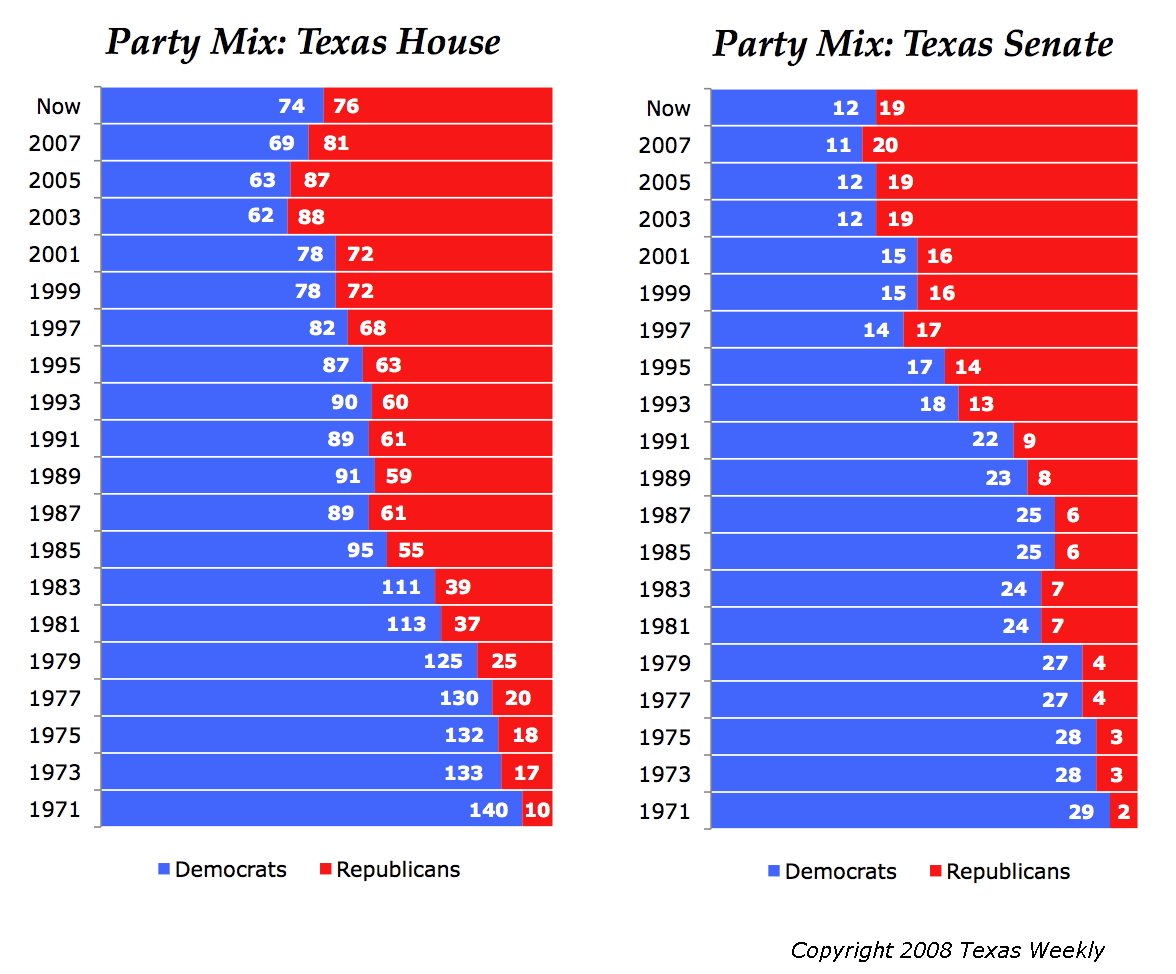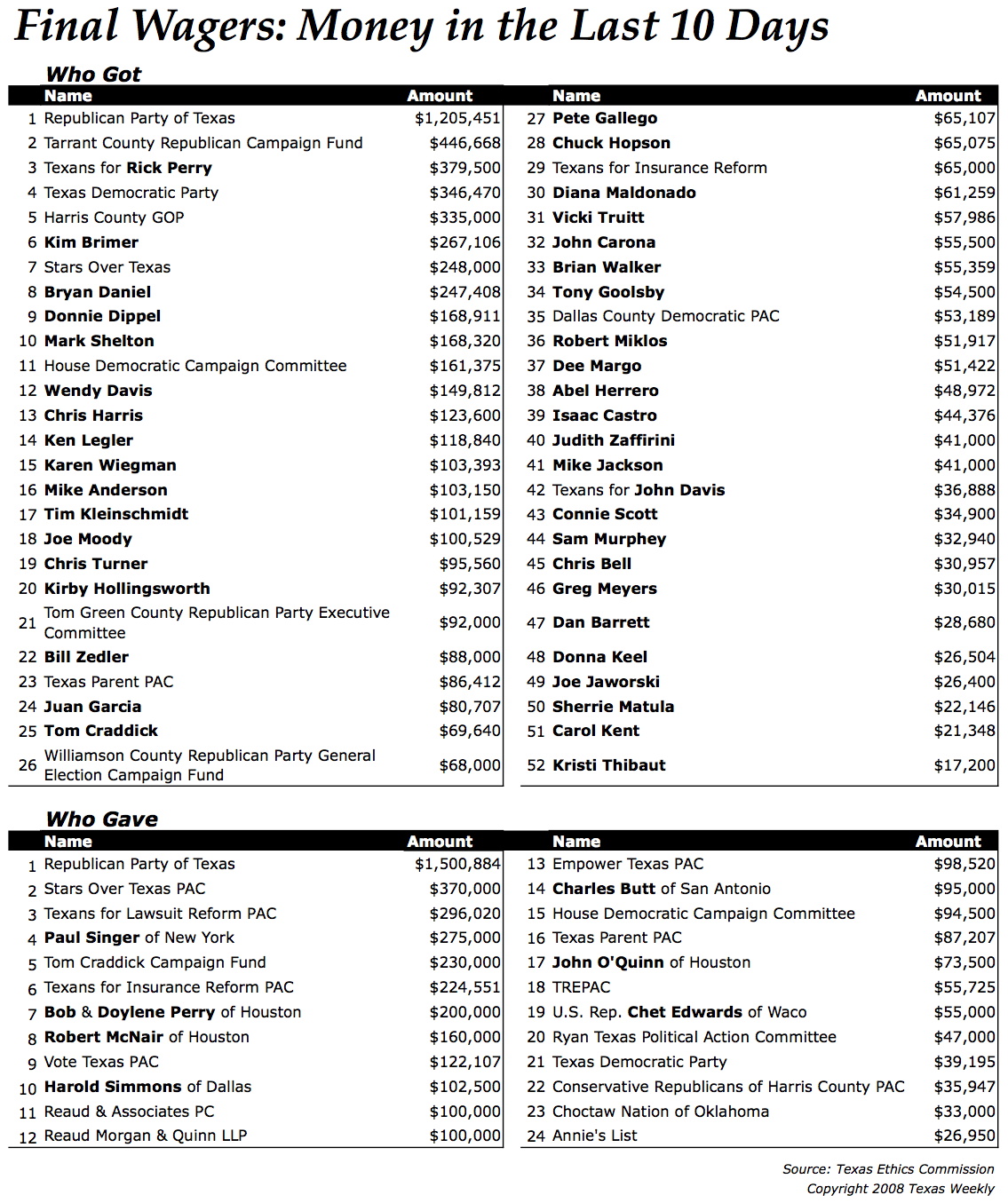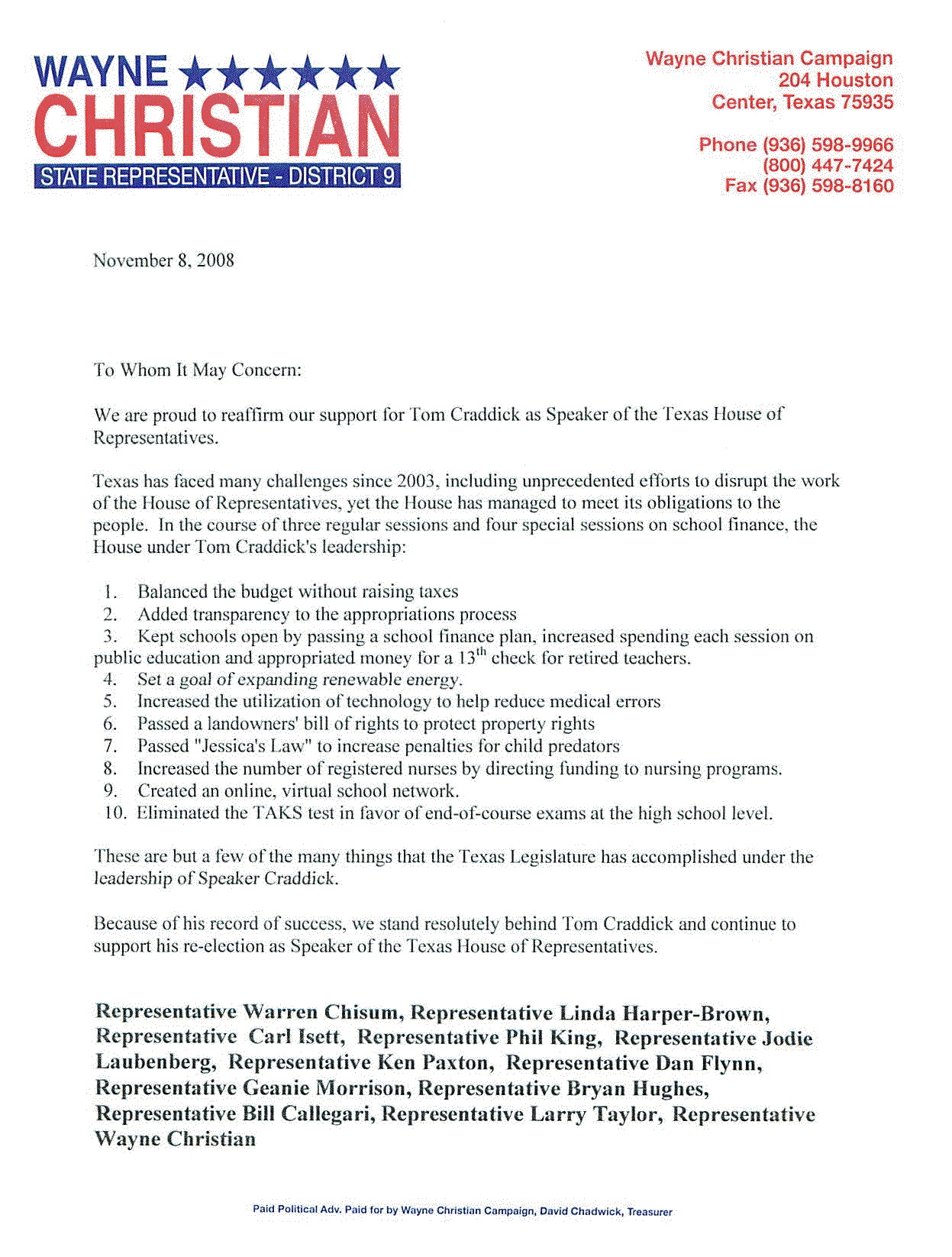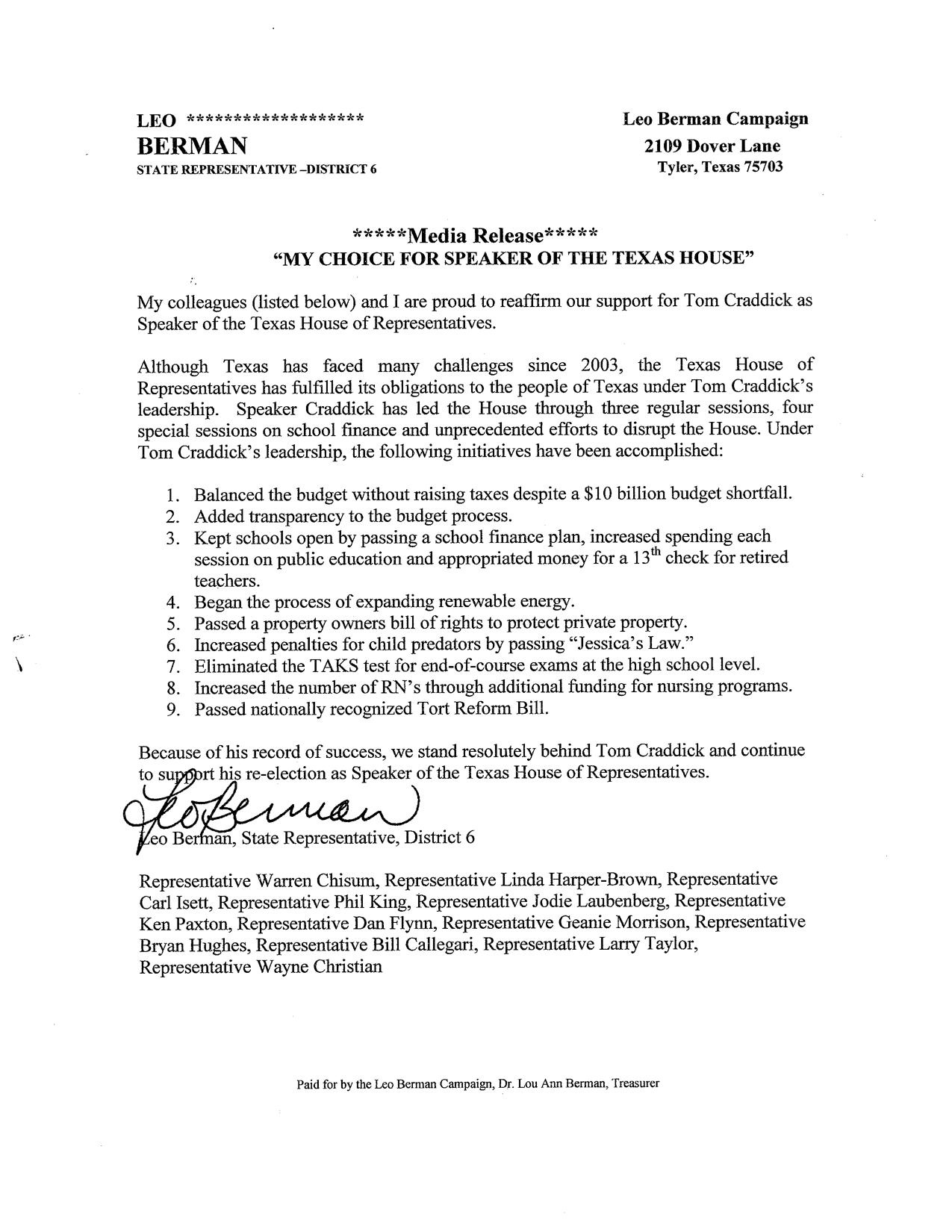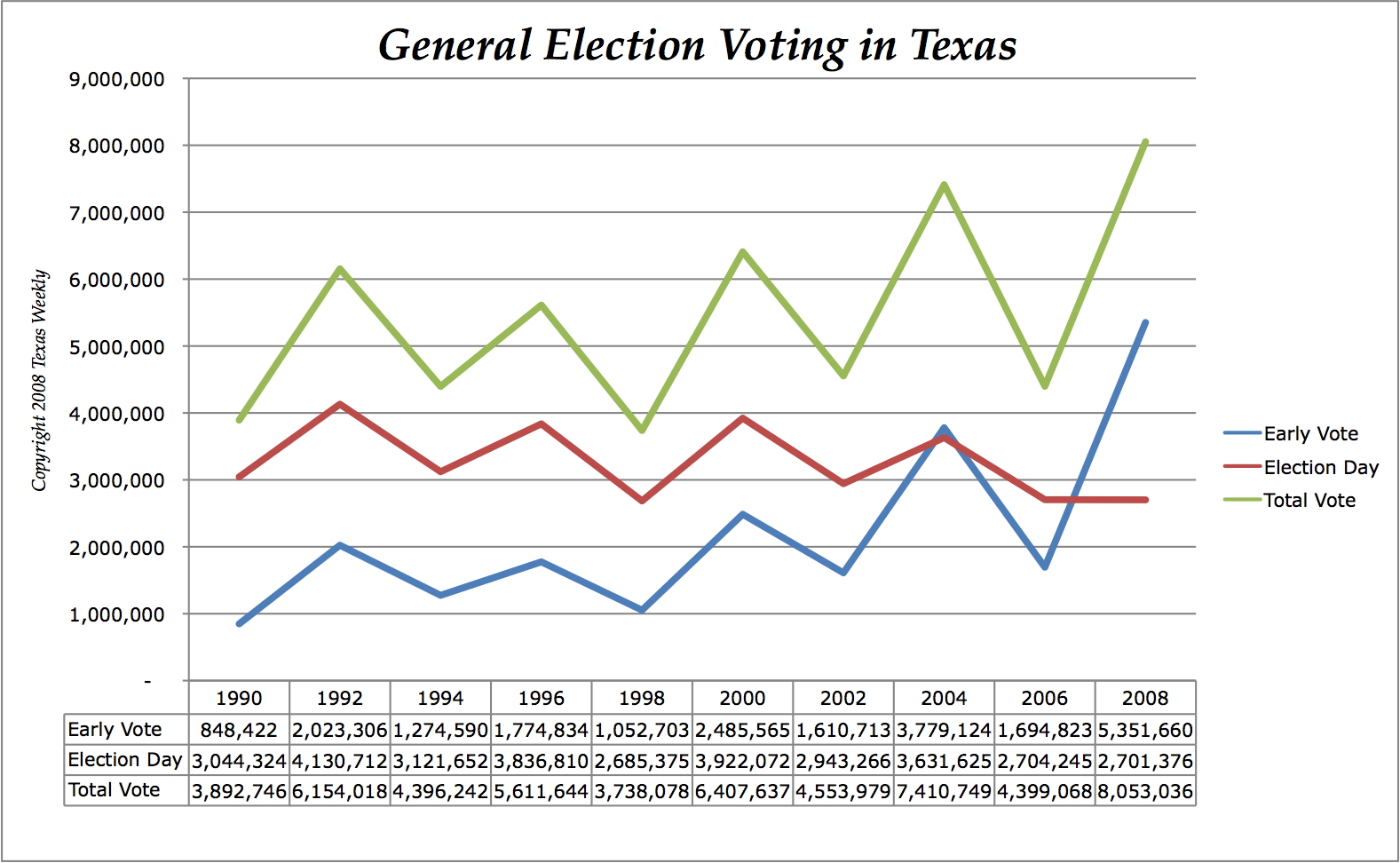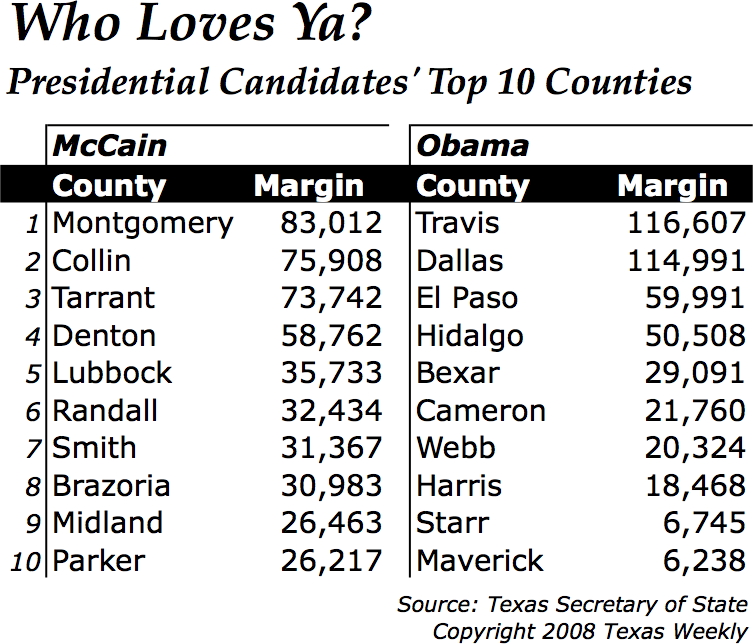Get used to that headline — we're keeping it until the race for speaker is over.
Texas votes put 74 Democrats, 75 Republicans, and one Question Mark into the Texas House, setting off simultaneous scrambles for the seat in Irving and the corner office occupied by the chamber's presiding officer.
If anyone in the House had the 76 votes needed to become the next speaker on January 13, we'd be reporting on what was said at the press conference announcing their victory.
No press conferences yet, gang.
Democratic victories on Tuesday cut into Speaker Tom Craddick's hold on the job — a grip already weakened by challenges from would-be speakers and by his assertive reading of the House's own rules.
He doesn't have the votes.
And his opponents, led by the House Democratic Caucus, are asking colleagues to pledge in writing that they won't vote for him again. That Non-Speaker election could open the field for the regular Speaker election in January, just by turning the Craddick incumbency into an open seat.
They don't have the votes.
Several candidates for speaker on both sides of the aisle are ready to go — some filed, some not.
They don't have the votes.
And until the outcome in the Irving seat now held by Republican Rep. Linda Harper-Brown is known — she won by 29 votes and the lawyers on both sides are warring over provisional ballots and such — it's not clear whether the next speaker will be a Democrat or a Republican.
If Harper-Brown prevails, take the Democratic candidates out of the running (unless something seriously weird happens). Here's that list: Craig Eiland of Galveston, Pete Gallego of Alpine, Scott Hochberg of Houston, Richard Raymond of Laredo, Allan Ritter of Nederland, Senfronia Thompson of Houston, and Sylvester Turner of Houston.
If she loses, Craddick's chances plummet, and the list of replacements includes all of those Democrats, unnamed Republicans freed from their pledges to Craddick, and the Republicans whose names are already out there. The knowns: Byron Cook of Corsicana, Dan Gattis of Georgetown, Delwin Jones of Lubbock, Jim Keffer of Eastland, Edmund Kuempel of Seguin, Tommy Merritt of Longview, Jim Pitts of Waxahachie, and Burt Solomons of Carrollton.
Candidates for speaker have to file with the Texas Ethics Commission, which is now keeping a list. At our last check, these are the names of legal speaker candidates: Republicans Craddick, Jones, Keffer, Merritt, and Democrats Gallego, Hochberg, Ritter, Thompson, and Turner.
Common Cause
The Democrats in the Texas House don't agree a candidate for speaker and their leaders quickly realized that they weren't going to get everybody on board with that question. So they're asking a different question.
They split their query into parts, and part one, now in play, is "Do you want Republican Tom Craddick of Midland to have a fourth term as Speaker of the House?"
The answer to that — a strong "No" — appears to be the basis for the Democratic unity of the moment. They can always start another pillow fight if they get the chance to pick a replacement.
The mice have to bell the cat, asking members to sign a document saying they won't vote for Craddick under any circumstances. At a caucus meeting on the day after the elections, the Democrats got 60 representatives, give or take a few, to sign. That's supposedly risen to 63 names. They've asked Republicans who want to succeed Craddick to get signatures, too, and one of those tells us they've got 71 signatures, including the Democrats. Craddick's not talking, but a spokeswoman says her boss will repeat if Republicans are in the majority. And a former chief of staff to Craddick said in an email circulating among lobbyists that he's got 81 votes. If you're adding as you go, that's 152 votes in a 150-member House. If the schoolyard taunt is correct, someone's pants are burning.
If the Not Craddick gang comes up with at least 76 (and if all of those members feel bound by their own signatures), Craddick would be out of the running. That would free his remaining supporters to vote for someone else. It would free, in particular, the small group of Democrats who've supported Craddick in the face of increasing pressure from their colleagues, the so-called Craddick Ds. And it would free whatever Republicans have been looking for a change but who haven't felt politically safe saying so out loud.
It would also free other candidates for speaker, like Gattis and Solomons, who have been Craddick supporters in the past but would each like to occupy that corner office. There have always been Republicans in the House who aren't in the Craddick tent — the Gattis break could be a sign that some of his faithful supporters are breaking away.
Red Top, Blue Bottom
It wasn't a good Election Night for Republicans nationally, or in the Legislature, but the top of the Texas ballot is still bright red. The John McCain/Sarah Palin ticket got 55 percent of the vote, to 44 percent for Barack Obama/Joe Biden. U.S. Sen. John Cornyn did almost as well, snagging just under 55 percent to Democrat Rick Noriega's 44 percent.
Everyone in the congressional delegation — with the exception of Democrat Nick Lampson — won reelection to another two-year term. Republican Pete Olson got 52.5 percent and took back Tom DeLay's district for the GOP. John Culberson, R-Houston, easily survived a challenge from Michael Skelly, getting 56 percent. And Michael McCaul, D-Austin, managed an 11-point win over Democrat Larry Joe Doherty of Houston.
All of the statewide Republicans on the ballot were reelected, a crowd that includes Railroad Commissioner Michael Williams (52%), Texas Supreme Court Chief Justice Wallace Jefferson (53%), Justices Dale Wainwright (51%) and Phil Johnson (52%), and Court of Criminal Appeals Judges Tom Price (52%), Paul Womack (53%), and Cathy Cochran, who got 82 percent against a Libertarian.
Brimer Falls
Wendy Davis finished just below 50 percent and beat 20-year legislator Kim Brimer, R-Fort Worth, after an expensive and nasty race that cost the two candidates more than $3 million.
That's the first Democratic gain in the Texas Senate in ten years, and it's an insurance vote for Democrats who want some control over Senate business; they'll have 12 seats now, enough to block legislation under a Senate rule that requires approval from two-thirds of the members to consider bills.
Democrat Chris Bell finished first in the special election to replace Sen. Kyle Janek, R-Houston, but there's gonna be a runoff. In incomplete returns, Bell got 38 percent and Republican Joan Huffman got 26 percent, with four others splitting what was left. One strategy that worked: The last minute recruitment and heavy financial backing of Democrat Stephanie Simmons kept a Democratic turnout from electing Bell outright. She got almost 14 percent of the vote. Put another way, the two Democrats in the race got a total of 52.2 percent of the votes. A lone Democrat might have won it.
Sen. Mike Jackson, R-La Porte, easily held off Democrat Joe Jaworski, D-Galveston, after a noisy and expensive campaign. Jackson actually got a vote percentage comparable to or better than a couple of other senators who weren't generally thought to be in trouble, John Carona of Dallas and Chris Harris of Arlington. All of the state senators on the ballot this year, save Brimer, won reelection.
Jump Ball?
The numbers aren't final, and there's a challenge to be had in here, but it looks like the Texas House could convene in January with 75 Republicans and 75 Democrats sitting in those soft leather chairs.
Whether it comes to that or not, this is the third election in a row that the Democrats have taken turf from the Republicans in the Texas House. After redistricting changed the legislative maps, decisively, from blue to red, the Democrats have been chipping away at those Republican gains. In 2001, there were 72 Republicans in the Texas House. After the 2002 elections — the first after the redistricting maps took effect — they hit a high-water mark: 88 seats. The 2004 elections cut them to 87. In 2006, the GOP slipped to 81 seats. A party switch and a special election win trimmed that to 79. And the returns threaten the GOP's majority, depending on the outcome of a close race in Irving that's now in the hands of lawyers from both parties.
Flip these to the Republicans:
• Tim Kleinschmidt, R-Lexington, won Rep. Robby Cook's seat in the House, beating Democrat Donnie Dippel with 54 percent of the vote.
• Dr. Mark Shelton beat Rep. Dan Barrett in a Fort Worth rematch. Barrett never actually got to serve during a legislative session; he won a special election a year ago — Shelton was one of the people he beat — and then lost his bid for a full term. Shelton pulled 55 percent of the vote this time.
• Former Rep. Todd Hunter, a former Democrat running as a Republican, beat Rep. Juan Garcia III, in a Corpus Christi race. We know people on both sides of the party divide who thought that was in the bag for Garcia, including the folks at the 20/20 PAC, which was set up to protect a group of incumbent Democrats and sent out a fundraising letter two weeks ago boasting that the Garcia-Hunter race was over, in favor of the Democrat. Oops.
Flip these to the Democrats:
• Diana Maldonado defeated Republican Bryan Daniel in a Williamson County contest to replace Rep. Mike Krusee, R-Round Rock. She got 48.6 percent. That's a political canary in the coal mine for Republicans — that's the sort of Republican suburban county they've been counting on for their statewide wins for the last several election cycles. And it's a race where the frontrunners were kept below 50 percent by a Libertarian; Lillian Simmons got 4 percent.
• Chris Turner unseated Rep. Bill Zedler, R-Fort Worth, getting a little more than 51 percent of the vote. Zedler went on the target list two years ago when his reelection race — not really on anyone's political radar — was unexpectedly close. Democrats zeroed in on him this time and won.
• Rep. Tony Goolsby, R-Dallas, lost to Democrat Carol Kent by a convincing margin — she got 53 percent of the vote — in a district he's been battling to keep for three election cycles. He survived twice; three was too much.
• El Paso prosecutor Joe Moody overcame Republican Dee Margo — a candidate with serious money behind him in both the primary and the general elections — and is on his way to Austin with more than 51 percent of the vote. That seat had been held by Rep. Pat Haggerty, a Republican often allied with Democrats; Margo beat him in the primary.
• Kristi Thibaut won her rematch with Rep. Jim Murphy, R-Houston, garnering just over 50 percent of the vote. That was on some lists of hot races, including ours, but wasn't at the top. Both parties were pouring money into other contests and this one snuck up quietly.
• And attorney Robert Miklos, a Mesquite Democrat, outran former Mesquite Mayor Mike Anderson to win the seat that had been held by Rep. Thomas Latham, who lost to Anderson in March. Miklos got 50.6 percent.
That's six Democratic pickups to three Republican pickups, a net of three seats. The House currently has 79 Republicans (including two empty seats that had been held by Republicans) and 71 Democrats.
But look at this: In a race decided by just 29 votes, Rep. Linda Harper-Brown, R-Irving, beat Democrat Bob Romano. Tip your cap to James Baird, the Libertarian in HD-105 who kept both candidates from topping 50 percent. Count on a recount, with the highest stakes: This could be the seat that either puts the House in a 75-75 partisan tie or a 76-74 GOP advantage.
Republicans held these:
• After a hard-fought contest that was on the priority list for both parties, Republican Ken Legler got 51 percent vote total against Democrat Joel Redmond. That's a Republican seat in Pasadena, freed by Rep. Robert Talton's decision not to seek reelection.
• John Davis won again. He was on the Republican consultocracy's endangered list in March and won easily. And he won easily this time, pulling over 58 percent against Democrat Sherrie Matula.
• Ralph Sheffield survived a bloody primary and a bloody general election to win retiring Rep. Dianne White Delisi's seat, holding that spot for the GOP. He beat Democrat Sam Murphey, getting 54 percent of the vote.
Democrats held these:
• After redistricting, Democrats had to win in Republican-heavy districts to make gains in the Texas House. The corollary is that they are now defending themselves in Republican-heavy districts against a GOP that wants to get those seats back. This November's list of Democratic survivors includes Reps. Hubert Vo of Houston (56.3%), Allen Vaught of Dallas (50.5%), Kirk England of Grand Prairie (55.5%), Joe Heflin of Crosbyton (53.4%), Valinda Bolton of Austin (51.2%), Abel Herrero of Robstown (53.1%), Chuck Hopson of Jacksonville (49.3%, or 102 votes), and Mark Homer of Paris (51.7%).
Party Mix
How the parties stack up (at the moment) in the Texas Legislature. For sanity's sake, these are the numbers as of the beginning of each legislative session, with the exception of the listing for "now," which reflects the election results. Two House seats and one Senate seat are currently empty and were most recently in Republican hands. And the House number could change if a couple of recounts alter the results.
Following the Money
Political spenders in Texas moved about as much money in the last ten days of the campaign as in all of October, spreading scads of cash in legislative races, particularly in the House, where the partisan balance and the speakership were at stake. The money went where the risk to the interests is greatest. We've backed into these numbers because of the way campaign finance reports work at the end of each election.
The last full reports from the campaigns were due eight days before the election, and reflect contributions and expenditures and loans through October 25. After that, campaigns and political committees are only required to report significant contributions.
It's simple enough to say who got money — that's how they report it. To get to the big givers, we took those reports and sorted by donors. The caveat: Some reports are still coming in and being put online by the Texas Ethics Commission. And although we've captured what we could, variations in names stump the computers. For instance, "Craddick, Tom", "Thomas Craddick", and "Tom Craddick" come up in different spots on the list (he gave $230,000 and the people who got his money reported his name all three ways). With that, here's a look at the mountains of late money.
The Other Party
William B. Strange is the first Libertarian, according to that party's officials, to get more than a million votes in a Texas election.
He ran for a spot on the Texas Court of Criminal Appeals, and though Republican Cathy Cochran trounced him, he got 18 percent of the vote and ensured his party a place on the ballot two years from now. The actual number of votes: 1,041,499.
The Libertarians also claim "kingmaker" status in several legislative races where the combination of a Libertarian and a tight contest kept the winners under 50 percent of the vote. That includes Democrat Wendy Davis' upset of Sen. Kim Brimer in Fort Worth; the HD-11 race where Rep. Chuck Hopson, D-Jacksonville, won by just 102 votes; the HD-52 race, where Democrat Diana Maldonado of Round Rock won with 48.6 percent; and in the HD-105 race, where Rep. Linda Harper-Brown, R-Irving, beat* Democrat Bob Romano by less than three dozen votes. Their candidates shaved votes in other races, too, without bringing the winners under the 50 percent mark.
*That result is being contested, with batteries of lawyers from both parties working through recounts, counts of provisional votes, etc., etc., etc.
Random Election Notes
Barack Obama won in the biggest counties in Texas, but he was losing the state — and by a substantial margin — to John McCain.
He got his biggest raw-vote margins (in order) in Travis, Dallas, El Paso, Hidalgo, Bexar, Cameron, Webb, and Harris counties.
McCain wracked up his biggest margins in these counties: Montgomery, Collin, Tarrant, Denton, Lubbock, Smith, Brazoria, Midland, and Parker.
Obama won by more than 10,000 votes in eight counties. McCain won by more than 10,000 votes in 39 counties. The Republican took home a win in 226 of the state's 254 counties, the Democrat, the other 28. Obama's wins included nine of the state's 25 biggest pools of registered voters; McCain took the rest of that group.
• The state's top vote-getters this year? John McCain/Sarah Palin, with 4.47 million. Texas Supreme Court Justice Dale Wainwright had the lowest number of votes among the statewide winners, with 3.92 million.
• Sen. Judith Zaffirini, D-Laredo, easily won reelection, with an asterisk: She didn't lose any of the 17 counties in her Senate district. That's a first.
• The GOP still holds the 29 statewide posts in Texas, has a 20-12 advantage in the congressional delegation, a 19-12 advantage in the state Senate, and the slightest majority and a speakership, for now, in the Texas House. That last one is the only place where the majority party is seriously challenged right now.
• Republicans took back a couple of jobs they fumbled to Democrats in 2006. This time, the districts voted the way they were expected to vote last time had Republican candidates not given voters reason to switch.
In CD-22, Pete Olson got Tom DeLay's old seat away from Democratic U.S. Rep. Nick Lampson; Lampson won it away from Shelly Sekula Gibbs, who temporarily succeeded DeLay but didn't get on the ballot in time and had to rely on voters going to the polls and writing in her name.
And Republican Todd Hunter won the HD-32 race against Rep. Juan Garcia, D-Corpus Christi; Garcia won that seat away from Gene Seaman, who had homestead exemptions in both Corpus Christi and Austin — that's illegal — and who blamed his wife for creating the problem.
Without unblemished candidates on the ballot, both districts snapped back into the Republican column.
• Carole Keeton Strayhorn, rumored to be preparing a run for mayor of Austin, did some pre-election robo-calling to Austin voters, reminding them to vote. And helping them remember her name. The transcript: "This is Carole Keeton Strayhorn, calling about tomorrow's election. As Austin's mayor, I was Carole Keeton McClellan. As Texas Railroad Commissioner, Carole Keeton Rylander. As your Texas comptroller, Carole Keeton Strayhorn. My last name has changed a few times, but my commitment to voting and ensuring our freedom has never changed. If you have questions about how to vote, call me at 477-VOTE. That's 477-VOTE. This is one tough grandma, Carole Keeton Strayhorn. Please make sure you vote tomorrow. Thank you so much."
Callers got Strayhorn's recorded message giving out phone numbers for info on voting places and registration questions. And they were directed to a website. Guess whose mug is staring out at you when you get to TexasDemocracy.com?
Coy Pond
Mark no change here: Kay Bailey Hutchison isn't ready to say, and Bill White isn't ready to say.
They're both rumored to be candidates 2010 for statewide offices they don't currently hold — heck, they might even be running for the same office. But you wouldn't know it from listening to them talk with reporters.
Hutchison, the state's senior U.S. senator, has been looking at the governor's race for months. White, Houston's mayor, is usually the first name mentioned in conversations about which Texas Democrat might run for U.S. Senate or Governor next time around.
Gov. Rick Perry has said he'll seek another term, though he'll have served 10 years in the post by the end of his current term. And the Senate seat won't be open until Hutchison leaves. She's said publicly she won't seek reelection, and has told supporters privately that she could resign early to focus on the run for governor.
Both say the public is tired of politics now, and that they're not ready to announce anything. Hutchison says she's thinking about the race — that's not news — and that U.S. Sen. John Cornyn has now been in office long enough that her departure from the Senate wouldn't leave the state without experienced help in Washington, D.C. The election results didn't do anything to change her thinking, she said. "You know I can't say it now even if I wanted to — I haven't filed a campaign treasurer and that's the state law... It should be clear that I'm looking at it."
White, who's also been mentioned as a potential Energy Secretary in Barack Obama's new administration, says he hasn't decided what he'll do next. He's not even hinting, ticking off a list of things he's interested in on the federal level and things he's interested in on a state level. He does say he likes managing things — a lean to the executive post in Austin.
Still Some Life in It
Lt. Gov. David Dewhurst took office after a tough race against Democrat John Sharp in 2002, and the two are still snapping at each other.
Dewhurst told a crowd at a Center for Politics and Governance Conference that he's no fan of the state's new business margins tax, even though he presided over the Senate when it was passed. Sharp, working with Republican Gov. Rick Perry and a panel of business people, designed that tax.
At the University of Texas-sponsored conference, the Lite Guv said the tax creates a "structural hole" in the state budget because it spends (on property tax relief) less than it brings in. "I told John Sharp this," he said. "I said, 'Let's not going in that direction.' But nobody listened."
Sharp takes issue with that version, saying Dewhurst refused to meet with him until the end of the special session when the tax was enacted and says the Senate's presiding officer could have easily blocked the vote had he wanted to. "He never would meet with me" during the session, Sharp said. "And show me the speech where he told the senators he was against it."
As for the structural hole, that was noted in the comptroller's fiscal estimate of the tax package's impact. But that comptroller, Carole Keeton Strayhorn, was battling with other state officials on her way to an election fight against Perry, and her warning was discounted as political. Until she lost to Perry and the Legislature was back in session. By her estimate, the tax swap was $25.1 billion out of balance over its first five years. The cost of the property tax cuts in the package exceeded the new state tax revenues by that amount, she said.
Quotes of the Week
Jim Henson, director of the Texas Politics Project at the University of Texas, quoted in the Midland Reporter-Telegram: "You don't have to be a big-city guy to be speaker. What you have to do is have the votes."
Rep. Sylvester Turner, D-Houston, on his bid for the House's highest office: "It's a sad dog who won't wag his own tail... I'll continue to be a speaker candidate as long as I have a shot at getting it."
Rep. Tommy Merritt, R-Longview, saying he's running for speaker, in part, because of the political circus in the House last session: "What was best for Texas took a back seat to what was best for one member. That member was [House Speaker] Tom Craddick."
Rep. Jim Dunnam, D-Waco, on the current Speaker: "You can stick a fork in Tom Craddick. It's over." Rep. Mike Villarreal, D-San Antonio: "He means that literally."
Rep. Jim Keffer, R-Eastland, on the effort to unseat the speaker: "I think we're damn close."
Alexis DeLee, spokeswoman for Craddick: "The Republicans still have the majority. As long as they have a majority, he'll be the speaker."
U.S. Sen. Kay Bailey Hutchison, R-Texas, on the new administration coming to Washington and the Democratic majority in Congress: "However long I'm there, I don't want to vote 'no' all the time."
Houston Mayor Bill White, talking about problems measuring high school dropout rates: "If Wal-Mart can tell where ten big-screen TVs are, anywhere on the planet, and FedEx can find your envelope, we can intervene with dropouts."
Rep. Joe Heflin, D-Crosbyton, quoted in the Lubbock Avalanche-Journal on negative recorded phone calls to voters in his district: "It only makes people mad and wanting to vote more for me. I just got a call from a guy who said, 'I didn't know you were such a rascal but I voted for you anyway.'"
Texas Weekly: Volume 25, Issue 43, 10 November 2008. Ross Ramsey, Editor. Copyright 2008 by Printing Production Systems, Inc. All Rights Reserved. Reproduction in whole or in part without written permission from the publisher is prohibited. One-year online subscription: $250. For information about your subscription, call (512) 302-5703 or email biz@texasweekly.com. For news, email ramsey@texasweekly.com, or call (512) 288-6598.


